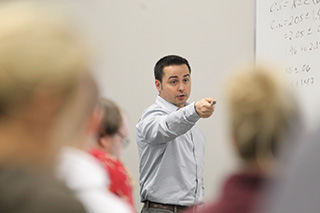Studying civic engagement in Missouri
Using the community as a laboratory for his research, Stout, along with colleagues Drs. John Harms and Tim Knapp, conducted a series of community assessments investigating how social connectedness, membership in voluntary associations and participation in the community are related to economic opportunity.
 “We want to inform policy … if we can weave together a civic infrastructure that is more inclusive, then more people will be empowered to have a voice in the future of their communities and their own lives,” Stout said.
“We want to inform policy … if we can weave together a civic infrastructure that is more inclusive, then more people will be empowered to have a voice in the future of their communities and their own lives,” Stout said.
The group also initiated a research project examining social capital and citizen participation in southwest Missouri.
They found that people in the region tend to have many interpersonal connections, high levels of participation in voluntary groups (especially faith-based organizations) and high levels of trust in others. However, their study revealed lower levels of civic engagement compared to the national average.
In 2010, Stout, Harms and Knapp completed the first-ever State Civic Health Assessment and they are now working on the second.
More recently, the team collaborated in the Neighbor for Neighbor initiative to bridge gaps between diverse populations within neighborhoods affected by economic hardships.
“The idea is to use small incremental changes to build trust, to increase social connectedness, and to empower people to work together to solve problems,” said Stout.


Nice interview, but your desk looks like mine. Not good. 😉